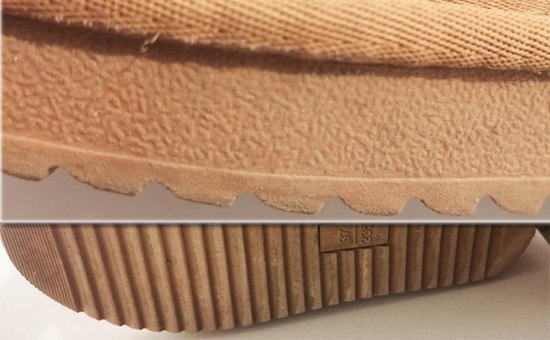
Nowadays, the requirements for the anti-slip performance of shoe soles are becoming higher and higher, such as casual shoes and hiking shoes. The rubber texture is soft and elastic, and it is used to make non-slip soles with excellent comfort. Tire recycled rubber is currently a cost-effective rubber raw material commonly used in the rubber product industry. It can replace natural rubber and general synthetic rubber to produce various rubber products, which significantly reduces raw material costs ; Then in actual production, can tire recycled rubber be used in the production of non-slip rubber soles to achieve the purpose of reducing costs? If so, what issues should we pay attention to?
1. Can tire recycled rubber be used in non-slip rubber soles?
At present, the non-slip soles on the market mainly include all-rubber non-slip soles and MD soles (EVA foam compression bonding, combined with rubber negatives). Non-slip rubber soles are generally processed from natural rubber and styrene-butadiene rubber; tire recycled rubber processed from waste tire rubber powder is compatible with natural rubber and styrene-butadiene rubber. In theory, it can be used in combination with the above two rubbers Production of non-slip rubber soles to reduce raw material costs.
2. Selection and skills of tire rubber in non-slip rubber soles
(1) When using tire recycled rubber to reduce the cost of raw materials for non-slip rubber soles, the full use of tire recycled rubber will cause the rubber sole to have reduced elasticity, abrasion resistance and anti-slip performance. Therefore, it is often used in combination with natural rubber and styrene-butadiene rubber. Many production experiences show that when using tire recycled rubber / styrene-butadiene rubber / natural rubber and rubber to produce non-slip rubber soles, styrene-butadiene rubber can combine non-polluting soft latex polystyrene butadiene rubber 2LLYY0302 and soft latex polybutylene filled with high aromatic hydrocarbon oil. Styrene rubber is blended to improve the abrasion resistance, flex resistance, adhesion, etc. of rubber soles, and further reduce raw material costs.
(2) When using tire reclaimed rubber with styrene-butadiene rubber and natural rubber to produce non-slip soles, in order to ensure human health, rubber product manufacturers must use odorless tire reclaimed rubber and environmentally friendly tire reclaimed rubber that have passed relevant tests to avoid irritation in rubber soles. Sexual odor, the use of inferior tire recycled rubber is strictly prohibited to avoid harmful substances affecting human health.
(3) Non-slip rubber soles are produced by combining tire reclaimed rubber with styrene-butadiene rubber and natural rubber. Excessive amount of tire reclaimed rubber will affect the performance and life of the sole. Too low dosage cannot achieve the purpose of reducing costs. Therefore, it is necessary to reasonably control tire Amount of recycled rubber. Usually 100 parts of raw rubber (total styrene-butadiene rubber and natural rubber) can be blended with 30-40 parts of reclaimed tire rubber, which can not only reduce the cost of raw materials, but also improve the vulcanization process performance to a certain extent and improve the comprehensive index of the sole.
3. Properly adjust the formula of non-slip rubber soles containing tire recycled rubber
When the appropriate amount of recycled rubber is used in the formulation of non-slip rubber soles produced by the combined use of styrene-butadiene rubber and natural rubber, rubber product manufacturers need to properly adjust the formula, especially the vulcanization system and the reinforced filling system. Among them, when tire vulcanization is used for tire reclaimed rubber / styrene-butadiene rubber / natural rubber and the rubber compound is vulcanized, the accelerator M can be mainly used, and a small amount of accelerator CZ and accelerator DPG can be used in combination; when using high wear-resistant carbon black to reinforce and fill with clay To increase the amount of RX-80 resin, increase the viscosity and toughness of non-slip soles; rubber product manufacturers also need to properly adjust the types and amounts of antioxidants and softeners.
The use of recycled tire rubber in non-slip rubber soles reduces the cost of raw materials. Rubber product manufacturers not only need to carefully choose recycled rubber, reasonably determine the amount of recycled tire rubber, properly adjust the formulation system, but also need to adjust the production process conditions. Later we have the opportunity to continue with you Explore.
Exclusive original article [commercial authorization] reprint, excerpt and excerpt in any form are prohibited without written authorization. Focus on Hongyun rubber: learn the process formula and raw material technology of producing rubber products from recycled rubber to help you reduce costs and increase profits